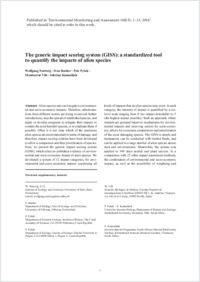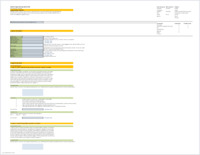The generic impact scoring system (GISS): a standardized tool to quantify the impacts of alien species
- Nentwig, Wolfgang Institute of Ecology and Evolution, University of Bern, Switzerland
- Bacher, Sven Department of Biology, Unit of Ecology and Evolution, University of Fribourg, Switzerland
- Pyšek, Petr Department of Invasion Ecology, Institute of Botany, The Czech Academy of Sciences, Průhonice, Czech Republic - Department of Ecology, Faculty of Science, Charles University in Prague, Czech Republic - Centre for Invasion Biology, Department of Botany and Zoology, Stellenbosch University, Matieland, South Africa
- Vilà, Montserrat Estación Biológica de Doñana, Consejo Superior de Investigaciones Científicas (EBD-CSIC), Sevilla, Spain
- Kumschick, Sabrina Centre for Invasion Biology, Department of Botany and Zoology, Stellenbosch University, Matieland, South Africa - Invasive Species Programme, South African National Biodiversity Institute, Kirstenbosch National Botanical Gardens, Claremont, South Africa
-
29.04.2016
Published in:
- Environmental Monitoring and Assessment. - 2016, vol. 188, no. 5, p. 1–13
English
Alien species can exert negative environmental and socio-economic impacts. Therefore, administrations from different sectors are trying to prevent further introductions, stop the spread of established species, and apply or develop programs to mitigate their impact, to contain the most harmful species, or to eradicate them if possible. Often it is not clear which of the numerous alien species are most important in terms of damage, and therefore, impact scoring systems have been developed to allow a comparison and thus prioritization of species. Here, we present the generic impact scoring system (GISS), which relies on published evidence of environmental and socio-economic impact of alien species. We developed a system of 12 impact categories, for environmental and socio-economic impact, comprising all kinds of impacts that an alien species may exert. In each category, the intensity of impact is quantified by a six-level scale ranging from 0 (no impact detectable) to 5 (the highest impact possible). Such an approach, where impacts are grouped based on mechanisms for environmental impacts and receiving sectors for socio-economy, allows for cross-taxa comparisons and prioritization of the most damaging species. The GISS is simple and transparent, can be conducted with limited funds, and can be applied to a large number of alien species across taxa and environments. Meanwhile, the system was applied to 349 alien animal and plant species. In a comparison with 22 other impact assessment methods, the combination of environmental and socio- economic impact, as well as the possibility of weighting and ranking of the scoring results make GISS the most broadly applicable system.
- Faculty
- Faculté des sciences et de médecine
- Department
- Département de Biologie
- Language
-
- English
- Classification
- Biological sciences
- License
-
License undefined
- Identifiers
-
- RERO DOC 261015
- DOI 10.1007/s10661-016-5321-4
- Persistent URL
- https://folia.unifr.ch/unifr/documents/305129
Other files
Statistics
Document views: 131
File downloads:
- pdf: 522
- Supplementary material: 131

